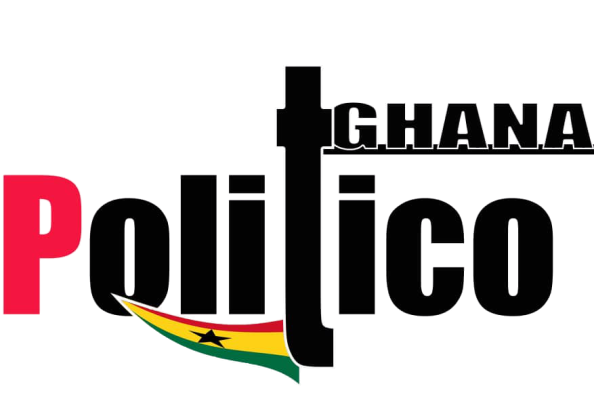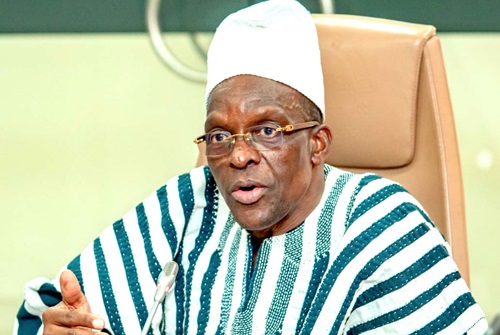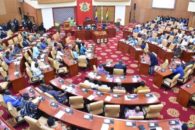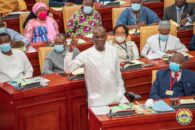The Speaker of the 8th Parliament of Ghana, Rt. Hon. Alban Sumana Bagbin, has assured members of the Parliamentary Press Corps that the Legislature will continue to invest in them by building on their capacities in order to live up to the evolving nature of parliamentary democracy in Ghana.
He said journalists play a very critical role in advancing democratic governance.
Therefore, it was important as an institution to invest in them through orientation workshops to keep them abreast with changing trends in parliamentary democracy to enable them to disseminate accurate information to their consuming publics.
“Parliament exists to better the lot of the people and develop the society’s call. As there is a gap between the people and their representatives, the media is the only link to bring constituents and lawmakers closer. In this regard, Parliament has to work with the media. The media has to understand what they do and why they do what they do and the changing nature of parliament and the democratic development challenges Parliament is facing with their rules,” he stated.
At the opening ceremony of a two-day orientation workshop on the revised Standing Orders of Parliament at Big Ada on Saturday, March 9, 2024, Speaker Bagbin charged the parliamentary correspondents to apprise themselves with revised Standing Orders.
This, he believes, will enable them to follow and understand parliamentary proceedings and apply them in their reportage.
Revised Standing Orders
The revised Standing Orders was adopted by a Resolution of the House on Thursday, December 21, 2023 and took effect on January 2, 2024.
Some of its unique features are the recital of the National Pledge; the conduct of parliamentary business through virtual platforms; new parliamentary committees, and re-alignment of some existing committees; and the conduct of roll call of Members of Parliament elect at the First Sitting of the First Session of Parliament;
The revised Standing Orders also has a provision to carter for Independent Members of Parliament who do not want to join either the Majority or Minority side of the House.
The rationale behind the revised Standing Orders was to improve the ability of Parliament to exercise its legislative power; enhance the oversight and accountability functions of Parliament; respond to changing trends in parliamentary democracy; improve on the language and structure of the provisions of the Standing Orders for clarity; enhance procedures of grievance redress by Parliament; and respond to recent judicial pronouncements relating to Parliament.
The document which regulates the conduct of parliamentary business, according to the Speaker, was structured to conform to changing trends in parliamentary democracy.
The previous Standing Orders existed for almost 24 years under the 4th Republic. It had 214 Orders whereas the revised Standing Orders has 293 Orders.
The orientation workshop for members of the parliamentary press corps follows a similar one that was organized for Members of Parliament a fortnight ago.
One-party system
The Speaker commenting further, explained that the initial concept in the 1992 constitution was for multiparty democracy, but the first parliament was branded a one-party system despite the fact that there were independent Members of Parliament.
“Gradually, the country is moving towards two major political parties’ representation, but the previous standing orders did not make provisions for an Independent MP, hence the revised standing orders”, he explained.
He cited the late Hawa Yakubu, a former MP for Bawku who was an Independent MP in the first Parliament of the fourth Republic who didn’t want to identify with the then Majority side, the National Democratic Congress (NDC), because her preferred party, the New Patriot Party (NPP) had boycotted the House.
Similarly, Samia Nkrumah of the Convention People’s Party (CPP) also did not want to belong to either the Majority or the Minority side of the House.
He said the revised document also addresses the issue of a hung parliament as is being witnessed under the current dispensation.
Contemporary challenges
The Clerk to Parliament, Mr. Cyril Kwabena Oteng Nsiah, in his remarks noted that contemporary challenges including demands for higher levels of transparency in the democratic process; inadequacy of manual work procedures in the effective discharge of the mandate of the Legislature; and the Covid-19 pandemic exposed some gaps in the previous Standing Orders, a situation he said, required the adaptation of innovative techniques and strategies in order to deliver on the mandate of Parliament.
He said the hung nature of the Eighth Parliament, which is the first of its kind since the inception of the Fourth Republic, presents a number of novel situations and challenges that were not within the contemplation of the drafters of the previous Standing Orders of the House.
“Under our current Standing Orders, the number of parliamentary Committees has increased from thirty-one (31) to forty-four (44) to emphasize the new focus and direction of the House, as part of efforts to expand and improve parliamentary oversight of activities of public officials.
Dedication
The Vice-Dean of the Parliamentary Press Corps, Stephen Odoi-Larbi, in his closing remarks commended the Speaker, Rt. Hon. Bagbin and the Clerk to Parliament, Mr. Nsiah, for their dedication to empowering parliamentary correspondents through continuous capacity-building programs.
He said feedback from the session indicated that there was the need for journalists to familiarize themselves with the revised Standing Orders to improve on their reportage and commentary on parliamentary issues.
He urged his colleagues to take the lessons learned seriously and to reflect on the knowledge gained in their reporting. He spoke on behalf of the Dean of the Parliamentary Press, Simon Agianab.
Story written by Stephen Odoi-Larbi




